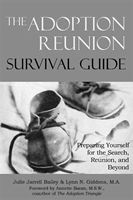Vol. 6, No. 2• May 2002
Struggling with the foster/adoptive child's attachment to the birth family
Book Review: The Adoption Reunion Survival Guide
by Becky Burmester
My Grandmother was an avid gardener. She could grow anything with ease. I have a clump of day-lilies that were a gift from her some 28 years ago. She sent them home with me in a box with a large clump of soil surrounding the roots. My husband carefully planted them in the yard of our first home. That clump of lilies has been moved and left behind at seven homes in four states. Reading The Adoption Reunion Survival Guide: Preparing Yourself for the Search, Reunion, and Beyond, by Julie Jarrell Bailey and Lynn N. Giddens, helped me to see that my Grandmother’s lilies are a lot like the children we foster and adopt. Without the roots from where they have been, they could not thrive where they are. If you want to become a better gardener of children, I suggest you read The Adoption Reunion Survival Guide.
******
Books help me get inside someone else’s feelings and understand another’s actions and reactions. The Adoption Reunion Survival Guide exposed me to ideas I had either never considered or had considered and dismissed as having little merit. It made me revisit some of my preconceptions and let go of some faulty thinking. I am a long-time foster parent to very young children (primarily newborns) and have no plans to adopt a child. What could a book about adoption reunions teach me?
As it turns out this book had a lot to offer me. After reading it, I feel even more strongly that foster and adoptive parents must become accepting of the idea that they are only one part of the parenting picture for their children. Talk with older adoptees in an environment where they are comfortable and listen carefully to what they have to say. Recognize the incompleteness they struggle with, the longing they have to understand the “why” of their adoptions, and the inner conflicts they fight as they try to reconcile the importance of knowing their past with the possibility that they might hurt their adoptive parents.
The Adoption Reunion Survival Guide is a brief but powerful book. In addition to offering a blue print for a search for birth family this book offers insight into the adoption triad from the perspective of birth parents. There are some excellent, thought-provoking questions for birth parents and adoptees to consider as they plan a search.
The authors do not naively assume that each search and reunion has a happy ending. They carefully set out a wide variety of scenarios and help the reader examine the approaches that might best meet his or her own needs.
As the Adoption Reunion Survival Guide makes clear, no child exists in isolation. No child simply “is” with no attachments or influences prior to becoming part of our family. The emotional health of adoptees, foster children, and foster and adoptive parents will be enhanced as everyone involved accepts the importance of roots.
Support the NCFPA by purchasing this book online through our website at www.ncfosterparents.org and click on the Amazon link. The price is $11.16, with a portion of the price going to NCFPA. Thanks and happy reading.
If you have comments about this book or another book you would like to see reviewed, please contact me (919/870-9968 or [email protected]).
Copyright � 2002 Jordan Institute for Families

